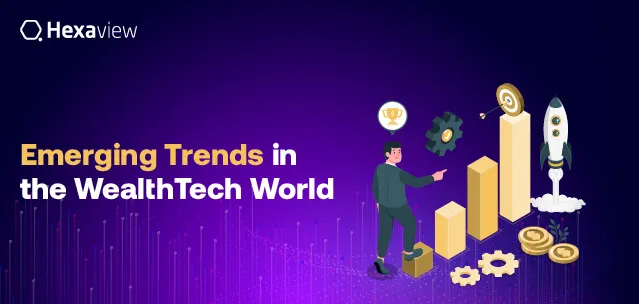Technological advancements in the WealthTech sector have led to the emergence of many trends. An unprecedented reliance of wealth managers and financial advisors on technology is likely to help organizations and individual clients in many ways. This piece intends to familiarize its readers with the most prominent trends in the WealthTech world and their possible impact on the lives of all the stakeholders. Along with the benefits associated with the adoption of novel technology, the challenges bundled with the same are also documented in detail. So, read on!
Emerging Trends in the WealthTech World
An impressive surge in the use of Robo-Advisors
As per a study conducted by the prestigious market research firm Polaris Market research, the robo-advisory market is expected to hit a whopping $72 billion mark in terms of valuation by 2032. Wealthfront was the first robo-advisor and it was launched back in 2008. Robo-advisors offer financial advice and involve minimum or zero human intervention. Robo-advisors offer financial advice and manage investment portfolios with the help of algorithms. The passive indexing strategies are automated and optimized by the robo-advisors based on modern portfolio theory (MPT).
The acclaimed economist and Nobel laureate Harry Markowitz came up with this theory back in 1952. MPT helps in the creation of diverse portfolios and maximization of returns with an acceptable degree of risk associated with the trades. The retail investors are tempted towards robo-advisors owing to automation, low cost, and the requirement of just a nominal opening balance. Wealthfront, Betterment, Merrill Guided Investing, M1 Finance, and E*TRADE are the best robo-advisors that are currently available in the market.
The benefits offered by robo-advisors that are documented above are also bundled with a few limitations. Automation associated with robo-advisors becomes a challenge in case of exceptional situations. The lack of human interaction is also not helpful in several situations. Performing complex operations like estate planning, retirement planning, and complicated tax management is also a challenge associated with robo-advisors. Therefore, calling the robo-advisors as facilitators as well as disruptors in the WealthTech sector will be highly appropriate and rational.
A rapid shift towards ESG Investing is evident
The WealthTech sector is witnessing an impressively fast movement towards Environmental, social, and governance (ESG) investing. ESG Investing involves the alignment of investments with environmental, social, and governance values to ensure a sustainable future. Investors rely on several metrics and data to evaluate the sustainability performance. However, the absence of standardization in these metrics and data makes it difficult to accurately determine the sustainability performance.
Environmental factors include but are not limited to climate change, carbon emissions, pollution, resource depletion, and renewable energy. Social factors include human rights, employee diversity, labor practices, and consumer protection. Governance factors include transparency, ethics, compensation, and shareholder rights.
Risk mitigation, customer loyalty, improved operational efficiency, regulatory compliance, and adaptability to the changing market dynamics are the key benefits associated with ESG Investing.
Blockchain is witnessing an unprecedented adoption
Blockchain is a revolutionary distributed ledger technology that facilitates the secure recording and verification of transactions in a decentralized network. Transparency, asset tokenization, fractional ownership of assets, increased liquidity in the market, security, and efficiency are the key benefits associated with blockchain and the same benefits have played a vital role in ensuring that blockchain is now being widely used by the WealthTech players regardless of their size.
Scalability, regulatory uncertainty, privacy, and interoperability are the biggest challenges associated with blockchain. However, the technological advancements will easily take care of the issues pertaining to scalability and interoperability. The evolving regulatory frameworks will neutralize the uncertainty level to a significant level. Therefore, ultimately, blockchain is likely to be a facilitator for all the stakeholders in the WealthTech sector.
The focus on compliance and risk management continues to grow
WealthTech firms are now extensively using technology to stay compliant with all the regulatory requirements. Several processes are being automated and all the risks are monitored daily. Complexity in regulations, resource constraints, and ongoing updates are the biggest challenges.
Cybersecurity: WealthTech organizations are mindful of the need to acquire the most sophisticated security solutions to ensure the delight and retention of their loyal customers. Therefore, a whopping amount of money is now being spent to deploy the most powerful security systems. Cybersecurity threats are extremely common, dynamic, and frequent. Therefore, the massive spending on security solutions must never stop.
Alternative Investments: Private equity, venture capital, real estate, commodities, hedge funds, collectibles, and cryptocurrency are the alternative investment options that are now available for the investors along with the conventional asset classes. Such options are attracting investors who are looking for diversification, higher returns, and unique opportunities.
Cryptocurrency is a digital form of currency that is built on the blockchain technology. Unlike the conventional currencies that are issued and regulated by the governments, cryptocurrencies are operated on decentralized networks and involve peer-to-peer transactions. Intermediaries like banks and financial institutions are absent in the world of cryptocurrency. Bitcoin, Ethereum, Binance Coin, Cardano, Solana, XRP, Dogecoin, Polkadot, Avalanche, and Litecoin are the most popular cryptocurrencies that are currently available in the market.
Volatility, regularity uncertainty, security risks, scalability, and adoption barriers are the biggest challenges associated with cryptocurrencies. Due to the rapid fluctuations in price based on speculation, market sentiment, regulatory developments, and macroeconomic factors, many investors refrain from trading in this novel currency. The absence of global and mainstream acceptance also repels a big number of investors. However, once regulated, cryptocurrencies are likely to tempt a sea of investors across the globe. So, for now, the wait and watch strategy makes a lot of sense.
Hexaview Technologies is a digital transformation organization engaged in offering WealthTech services to clients across the globe for over a decade now. Hexaview is equipped with a rich number of experienced resources who have played key roles in the development of multiple wealthtech solutions.
If you liked what you read, please feel free to browse our entire library of blogs. You can also follow us on all the social media platforms to keep yourself updated with all the developments, trends, and disruptions in the WealthTech sector.



%201.svg)
